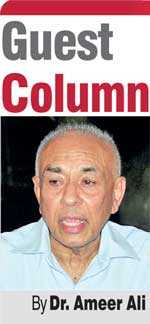Wednesday Feb 18, 2026
Wednesday Feb 18, 2026
Friday, 9 November 2018 00:00 - - {{hitsCtrl.values.hits}}

The gruesome murder of journalist Jamal Khashoggi, details of which are slowly emerging in the public media outside Saudi Arabia, and the scandalous cover ups of the ‘heinous crime’ has brought shame not only to the rulers and subjects of that country but also embarrassment to Muslims all over the world, the umma.
The President of Turkey has accused the Saudi State directly for masterminding that murder. The order to neutralise Khashoggi appears to have gone from the Saudi Royal household. The world is obviously outraged and demands the UN to carry out an independent investigation. There is no place for the regime to hide its shame and stupidity.
Being the world’s largest oil producer with a huge petrodollar largesse, as a Sunni Muslim religious leader with sovereignty over the two holiest of Islam’s mosques in Mecca and Medina – the land of the Prophet of Islam, and as US’ invaluable “customer and ally”, the desert kingdom, in spite of all its tribal idiosyncrasies, is reluctantly courted by the weak and powerful within the family of modern nations but with different objectives.
While Saudi Arabia is an “eternal friend” of the US and long-term ally of the West, it is also a country that awkwardly carries the reverence of ordinary Muslims the world over. Yet, the Saudi political structure, its tribal governance, its archaic legal procedures and ultra-orthodox religious ideology have caused numerous instances of discomfort, displeasure and dissonance, which the Sunni Muslim world is compelled to ignore and tolerate for the sake of maintaining some semblance of unity. Yet, in many respects that country is in many ways an embarrassment to the umma.
From the point of view of Muslims living outside Saudi Arabia, there are at least three issues that cause serious discomfort, and at times even anger. Firstly, a country that is named after and ruled by a family (there is no other country in the world that carries a family name), incarcerates and beheads the regime’s dissenters, and a leading partner in causing death and starvation to nearly fourteen million Yemeni Muslims audaciously declares the Holy Quran is its constitution. In the light of the way that country is ruled this is an insult to that holy tome.
Besides, everywhere and at all times constitutions are human creations and are subject to amendments, abrogation, arbitration and even suspension. Can the Quran be subjected to any of these? To Muslims, the Quran is the direct word of God revealed through Archangel Gabriel to Prophet Muhammad. It can be interpreted but not interfered with in any other manner. At best, Saudi Arabia can draw a constitution based on their interpretation of the Quran, and alter that constitution to suit its convenience. Instead, by calling the Quran itself as its constitution and trying to justify its actions in terms of the Quran, the Saudi regime is actually putting God on the dock? How can the umma tolerate this absurdity?
Secondly, the Saudi national flag carries in print Islam’s creedal essence, kalima shahada (la ilaha illallah Muhammad al-rasoolullah meaning there is no God but God and Muhammad is His messenger). Without confessing to this quintessential principle there is no sense in calling oneself a Muslim.
Late in the 1990s, the organisers of FIFA World Soccer Cup tournament quite innocently decided to emboss the flag designs of all participating countries on the leather of the ball. Obviously a soccer ball is meant to be kicked. What a shock it was when Muslims saw a ball with kalima on it being kicked around physically. It was the organised protest from Muslims world over that made FIFA to withdraw those balls.
This can happen again during anti-Saudi protests outside the country when protesters burn and vandalise the Saudi flag. Won’t that be considered as acts of blasphemy by Muslims? But who can blame the protestors for a Saudi stupidity? Does the umma of the Prophet deserve all this?
Thirdly, with sovereignty over Mecca and Medina, Saudi regime is able to politically determine who can and cannot perform hajj, the obligatory pilgrimage for all Muslims who could afford. In the hands of the Saudis a religious obligation has become a political tool to win Muslim support internationally. This is arrogant interference in God’s command. It is time the Muslim world demands Saudi Arabia to relinquish its control and transfer the management of hajj to a consortium of Muslim countries. If the OIC can act on this it would be a great service to Islam and Muslims.
Fourthly, the country’s Salafi ideology is the most ultra-orthodox, which has now come under intense criticism not only by Muslim scholars outside the country but also from within. A number of Saudi critics are already in prison or under house detention. However, the government’s endeavour to export that ideology with financial support to its adherents and with the blessing from US superpower is destabilising Muslim communities all over and especially in plural societies. There is no denying the fact that Saudi brand of Salafism is one of the contributory factors in the rise of Islamophobia.
There are several other issues regarding the internal politics and governance of Saudi Arabia, which are matters entirely for Saudi citizens to settle.
(The writer is attached to the School of Business and Governance, Murdoch University, Western Australia.)